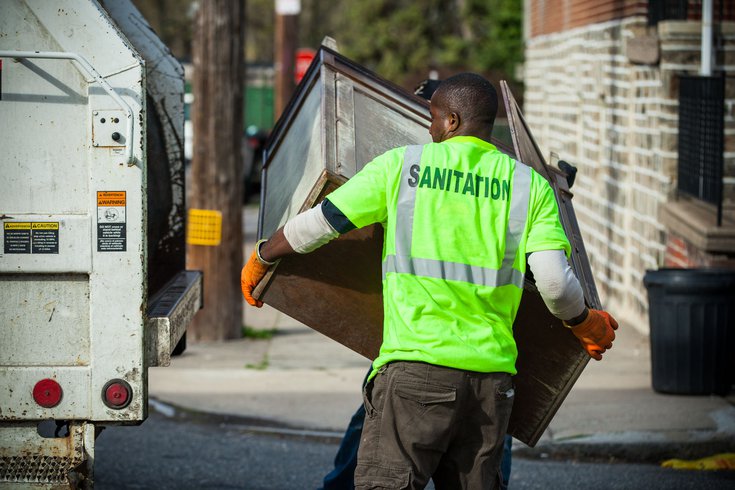
February 01, 2023
 Thom Carroll/for PhillyVoice
Thom Carroll/for PhillyVoice
Waste Free Philly asked the 2023 mayoral candidates to pledge to stop short dumping and littering in five years, among other measures. Rev. Warren Bloom and former City Councilmember Derek Green have signed on.
A coalition of environmental groups called on Philadelphia's mayoral candidates to commit to ending littering and illegal dumping by 2028 — and two have heeded the call.
Waste Free Philly unveiled its five-point agenda at a press conference Wednesday, asking the city's many mayoral candidates to sign on to the plan. The agenda calls for the city to create a new Office of Zero Waste and new job title, deputy streets commissioner of zero waste, as well as the appointment of "experienced and accomplished individuals" to various jobs in the Streets Department and an outreach campaign to explain how the city manages waste materials.
The coalition also wants the next Philadelphia mayor to "recommit" to the city's plan to achieve zero waste by 2035 and, even more ambitiously, create a new program to end illegal dumping and littering by 2028.
"Statements alone are not enough," Nic Esposito, director of policy and engagement for Circular Philadelphia, said at the press conference. "The time for action is now."
Two Democratic candidates for mayor — Rev. Warren Bloom and former City Councilmember Derek Green — committed to the agenda on the spot. In an emailed statement, Rebecca Rhynhart said she "look(ed) forward to working with Waste Free Philly to learn more about their platform and how the Rhynhart campaign can be supportive."
Allan Domb said via email that he supported "four of the five pillars of (the) agenda," but could not commit to creating an Office of Zero Waste or appointing a deputy streets commissioner of zero waste.
"In this campaign, groups have already called upon candidates to create a number of new positions and if every request for a new position was honored, we would have a totally unworkable, chaotic government," he continued. "I believe the Streets Department and Department Licenses and Inspections have the ability currently to achieve Zero Waste by 2035, as long as there is proper leadership in the Mayor's office."
The other six candidates have yet to comment.
Illegal dumping and rampant litter are problems that have only gotten worse in recent years, residents complain. The city's last Litter Index report, released in 2019, showed an increase in littering, with short-dumped construction debris being the most common type. According to City Council testimony from Streets Commissioner Carlton Williams, the Streets Department removed 7,171 tons of illegally dumped materials and 83,600 tires from across the city in 2021, up from 6,377 tons of short dumping and just 30,800 tires in 2020.
As criticism about illegal dumping has grown, the city has imposed heftier fines, and taken offenders to court. While a single instance of illegal dumping previously carried a maximum fine of $5,000, new updates to the Philadelphia Code allow the city to fine up to $5,000 per large item and charge additional clean-up fees. This resulted in the first successful civil prosecution of an short dumper last October; the defendant was ordered to pay $10,700.
The Streets Department has also installed more cameras to catch illegal dumpers in the act, and currently boasts a surveillance network of about 250 cameras trained on frequent problem areas.
But the waste reduction, clean air and clean water groups that make up Waste Free Philly say that isn't enough. The Streets Department needs to prioritize prevention and recycling over collection and incineration, and the city need to transition to a more circular economy, which emphasizes the repurposing, repair and reduction of waste. This model could also create additional jobs in composting and textile recycling, coalition leaders said.
Some Philadelphia residents at the conference expressed frustration over being left out of the conversation after spending years cleaning up their own communities. Still, they agree that the trash problem needs more city intervention.
"We're near Temple University. We've been begging (the city) to come up with a comprehensive plan to deal with Temple student trash," Judith Robinson, president of Susquehanna Clean Up/Pick Up, said. "We used to have two trash days ... I'm asking everyone to say, 'Hey, the next mayor, we want our two trash days back.'"
While the assembled leaders of Waste Free Philly were reluctant to directly criticize Streets Commissioner Williams or Mayor Jim Kenney, the frustration with the current administration was palpable. Esposito recently ran the city's Zero Waste and Litter Cabinet, while speakers Samantha Wittchen and Maurice Sampson also consulted or worked for the city at various points in their careers.
"We haven't had a commitment (from) the mayor that's held," Sampson said. "It's not complicated. It's not more than that."
That's why Sampson and the rest of the coalition are insisting on a department within the Mayor's Office, to be created within the new administration's first 100 days in office. The mission to make Philadelphia a zero waste city, they said, has to feel personal for the city's next leader.
"If the mayor doesn't want to do it, it's not going to happen."
This story has been updated with a statement from Allan Domb.
Follow Kristin & PhillyVoice on Twitter: @kristin_hunt
| @thePhillyVoice
Like us on Facebook: PhillyVoice
Have a news tip? Let us know.